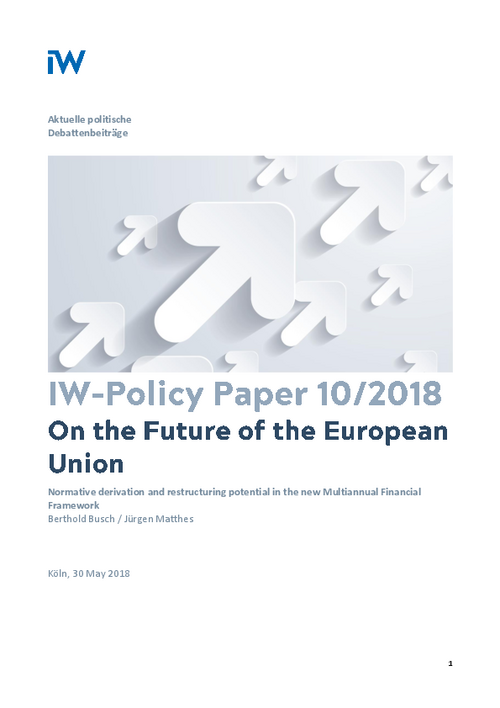The debate concerning the future of the EU has been in full swing ever since Emmanuel Macron’s (2017) Sorbonne speech. New threats to internal and external security in Europe require a stronger EU. In addition, Brexit is ripping a hole in the EU finances.

On the Future of the European Union
IW-Policy Paper

The debate concerning the future of the EU has been in full swing ever since Emmanuel Macron’s (2017) Sorbonne speech. New threats to internal and external security in Europe require a stronger EU. In addition, Brexit is ripping a hole in the EU finances.
This pressure for reform must be used to establish new priorities in the EU budget when discussions are held about the next Multiannual Financial Framework (MFF) 2021–2027. The European Commission has put forward different options for consideration as part of the discussion process, and this study is based on them. It takes the form of a normative review of EU tasks, which has two evaluation criteria:
- Firstly, there will be a discussion concerning which political areas should be the responsibility of the EU, and which of the member states. Cross-border spillover effects, economies of scale, preference differences and the subsidiarity principle, all have an important role to play when assessing EU added value on the basis of existing criteria and studies.
- Secondly, various policy fields will be examined to establish whether, and to what extent, they meet Musgrave’s three criteria of public finance policy: allocation/growth, distribution/structural change cushioning, macro-economic stabilisation.
As a result, the following recommendations are derived:
- In the area of security – especially in defence policy, external border security, and the fight against terrorism – the EU should have a clear responsibility, because security is a European public good from an allocative view. Here the EU budget clearly needs more resources.
- Although it is true that in the areas of research, education, infrastructure and digitalisation, targeted state funds can fundamentally promote the potential for growth, this is primarily the task of the member states. Yet if sufficient cross-border spillovers can be identified, an EU responsibility is justified. The funds for these future-oriented tasks should be increased in the EU budget if they are of cross-border relevance.
- With regard to agricultural and cohesion policy the assessment is mostly critical. In relation to agriculture subsidies, an EU responsibility can hardly be derived and they cannot be sufficiently justified against the Musgrave criteria either. Neither is there any valid justification for the EU to be responsible for cohesion policy in prosperous member states.
As a result, the highly expensive agricultural and cohesion policy should be de-prioritised. Big levers can be made available by means of a reallocation of EU funds. In fact, with savings of around 2 per cent in current agricultural and cohesion spending, the Erasmus+ programme could be doubled or, alternatively, expenditure for cross-border infrastructure could be increased by half or the additional defence expenditure proposed by the European Commission could be funded. To be able to fund all the tasks that are identified here as priorities, a reduction of agriculture and cohesion expenditure of around 10 per cent in the new MFF would suffice, assuming a nominal growth of a good 28 per cent within seven years.

Berthold Busch / Jürgen Matthes: On the Future of the European Union
IW-Policy Paper

More on the topic
Not so Different?: Dependency of the German and Italian Industry on China Intermediate Inputs
On average the German and Italian industry display a very similar intermediate input dependence on China, whether accounting for domestic inputs or not.
IW
China’s Trade Surplus – Implications for the World and for Europe
China’s merchandise trade surplus has reached an all-time high and is likely to rise further. A key driver appears to be a policy push to further bolster Chinese domestic manufacturing production, implying the danger of significant overcapacities.
IW